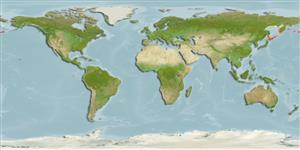Teleostei (teleosts) >
Perciformes/Zoarcoidei (Eelpouts and pricklebacks) >
Stichaeidae (Pricklebacks) > Stichaeinae
Etymology: Stichaeus: Greek, stix, -ichos = row (Ref. 45335).
Eponymy: Dmitriy Ivanovich Ochryamkin (aka Okhryamkin) was a Russian fisheries scientist who was very active in the Russian Far East (1930s). [...] (Ref. 128868), visit book page.
Environment: milieu / climate zone / depth range / distribution range
Ecology
Marine; demersal; depth range 2 - 157 m (Ref. 133174). Polar; 1°C - 22°C (Ref. 133174)
Northwest Pacific: southern Kuril Islands, southwestern Okhotsk Sea, Tatar Strait to Peter the Great Bay and Moneron Island, Japan Sea.
Size / Weight / Age
Maturity: Lm ? range ? - ? cm
Max length : 40.0 cm TL male/unsexed; (Ref. 56557); common length : 20.0 cm TL male/unsexed; (Ref. 56557)
Occurs in coastal waters (Ref. 51666). Inhabits sandy bottoms with coarse and silted sand, seagrass beds and rarely in rocky slopes with sand (Ref. 133174).
Life cycle and mating behavior
Maturity | Reproduction | Spawning | Eggs | Fecundity | Larvae
Sokolovskaya, T.G., A.S. Sokolovskii and E.I. Sobolevskii, 1998. A list of fishes of Peter the Great Bay (the Sea of Japan). J. Ichthyol. 38(1):1-11. (Ref. 27683)
IUCN Red List Status (Ref. 130435: Version 2025-1)
Threat to humans
Harmless
Human uses
Tools
Special reports
Download XML
Internet sources
Estimates based on models
Phylogenetic diversity index (Ref.
82804): PD
50 = 0.5156 [Uniqueness, from 0.5 = low to 2.0 = high].
Bayesian length-weight: a=0.01000 (0.00244 - 0.04107), b=3.04 (2.81 - 3.27), in cm total length, based on all LWR estimates for this body shape (Ref.
93245).
Trophic level (Ref.
69278): 3.7 ±0.2 se; based on size and trophs of closest relatives
Resilience (Ref.
120179): Very Low, minimum population doubling time more than 14 years (Preliminary K or Fecundity.).
Fishing Vulnerability (Ref.
59153): Low to moderate vulnerability (30 of 100).
🛈
